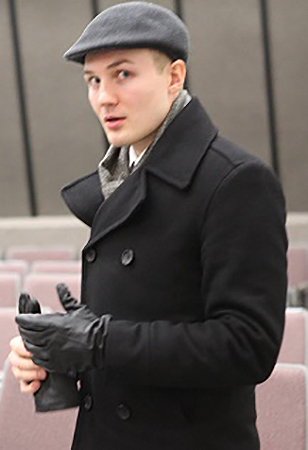
 I recently spoke with AUSU’s new (as of April 12) Vice President Finance and Administration, Scott Jacobsen, about some specific motivations and ambitions for his first term as an AUSU Executive. Scott is completing the third year of a general studies program at AU, and he has been an active member of AUSU council since April, 2016. His favorite course at AU so far was COMM100: Introduction to Research and Study Skills; it set the foundation for a successful approach to academia. Scott is a researcher, an avid volunteer, and a writer who resides in Langley, British Columbia with two cats, two dogs, and a bird. The love of his family and a wonderful group of “elder friends” inspires him to give back to the community in any way he can.
I recently spoke with AUSU’s new (as of April 12) Vice President Finance and Administration, Scott Jacobsen, about some specific motivations and ambitions for his first term as an AUSU Executive. Scott is completing the third year of a general studies program at AU, and he has been an active member of AUSU council since April, 2016. His favorite course at AU so far was COMM100: Introduction to Research and Study Skills; it set the foundation for a successful approach to academia. Scott is a researcher, an avid volunteer, and a writer who resides in Langley, British Columbia with two cats, two dogs, and a bird. The love of his family and a wonderful group of “elder friends” inspires him to give back to the community in any way he can.
Why did you decide to run for the position of VPFA?
For some background, prior to the election, I was a member, as a councillor, on each AUSU committee concurrently for several months, and the chair of the Awards Committee too. I enjoyed it. With the new position, these roles will change, with novel duties and responsibilities as the Vice President Finance and Administration. My experience and role preparedness seemed more instantiated with the experience in each relevant domain through committee experience over time. I wanted, or needed, to feel more responsible in the decisions being made.
That is, the VPFA position requires more time, experience, and skills, such as 30 hours or more per week, extensive knowledge of the bylaws and committees, ways to manage and take part in meetings or committees in a proactive, constructive, and assertive manner with the maintenance of respect among and between the meeting or committee members – even in disagreements, and so on.
The main consideration came weeks prior to the executive election. I wanted, or perhaps needed, external evaluation from individuals with the relevant experience and knowledge, or expertise. It seems more responsible to ask individuals with more expertise than myself?and to deter possible self-deception about personal abilities, interpersonal skills, knowledge, readiness, and talents. Sarah Cornett, B.Sc., C.A.E., the [former] executive director of AUSU, Julian Teterenko, vice president external and student affairs of AUSU, Kim Newsome, [former] vice president finance and administration of AUSU, and Shawna Wasylyshyn, president of AUSU, when independently asked, affirmed preparedness for me.
They work with me. They know the position. They understand me. I trust them. I work well with them as a team. Considering the comprehensive experience with the AUSU Committees, further reflection on personal and professional readiness, and affirmation, encouragement, and open support from the current ED, VPEX, VPFA, and president of my personal and professional preparedness, I went forward with it.
What unique perspective will you bring to the role?
I interview students. I interviewed an interim president and the current president of AU, and some AU staff. I wrote articles and education and science news briefs. I take part in a research group. I reviewed papers for IEEE through the research group. I take full-time classes. I took part in all the [AUSU] committees, including the temporary and special ones, to expand knowledge of the university, the student union, and fellow students. My experience and domain of competencies expanded in scale and scope, and precision.
What would you personally like to accomplish at AUSU over the next year?
To the thrust of the question, I see two domains. So for short answers: one, the fulfillment of tasks and responsibilities associated with the VPFA role; two, the expansion of the original initiatives for advocacy of students, especially student engagement within the constraints of the position’s responsibilities. A longer answer is many know the difficulty of student mobilization in an electronic environment. The online platform provides opportunities in expansive reach but difficulties in socio-emotional detachment from the learning environment.
My original statements when elected as a councillor remain the same. “I will focus on student involvement and research…student involvement, this is a concern for AU. This means advocacy, communication, and governance.” I said, “?undergraduate research, this is another concern at AU?For me, the core issue revolves around the possibility to involve students with research to continue their pursuits into graduate level accreditation?We’re here to learn, to grow, and have a little fun in the process. I found this for myself. I would hope to convey and provide this for others too.”
Also, I noted the legacy in development of the organization and student life in the largest online university in Canada. One person, or executive, or councillor, does not make a community. Therefore, the big goal remains fulfillment of duty, oath, and responsibilities in an honorable and respectful way; one honorable and respectful to the past, the present, and the future ? with the long view. In the panoramic view, my tenure on council and in executive will seem small, but [it is] important to succeed and perform the relevant duties as best as possible. My work and vision will take place in this context – to fulfill duties and engage with students.
In particular, can you identify one area of AU/AUSU advocacy that is important to you?
Numerous domains remain concerns for me. One perennial area for AU/AUSU advocacy – as many know – comes from the electronic means of communication with, dissemination to, and education of AU current and prospective students. It comes in the form of a question, “How can students stay, or even be more engaged with AU/AUSU?” An even deeper question I ask, “Why do students come to AU for education over other postsecondary institutions?” In an aspect of the why, the how emerges, the answer appears multipronged. It requires persistent effort over 1- to 5-year time horizons.
And what would be your approach to increasing student engagement?
That’s not easy in the knowledge economy, in the ’Global Village,’ made of an electronic environment with current and prospective students, faculty, staff, administration, and so on, each with valid, important concerns for the institution. I see student engagement as one area, but [it] requires the community at large because this seems like Russian dolls – a Matrioshka nesting. I don’t see a sole solution for one of the central issues for AU: student engagement. The AU/AUSU advocacy remains nested in relationships of various strengths and types. Happily, this AU/AUSU advocacy seems important to most active members of the AU community.
What is your vision for the Voice in one years’ time?
My vision for The Voice Magazine in one year: development, maintenance, outreach; the development of capacities to service student needs and voices as much as possible. The maintenance of the increased capacity and development insofar as this seems reasonable within employee energy, finance, and time constraints. Outreach to more students as the student magazine. Most postsecondary institutions have a magazine or a newspaper. It seems important to me, but to develop, maintain, and reach out to students as much as possible does not seem like an easy task?but doable, I trust.
If you’re a student reading this, I would love to hear from you: vpfa@ausu.org.
Bonita is a 3rd year bachelor of commerce student at AU, a mom-of-three, a political junkie, and an impassioned tennis fan, who just so happens to enjoy attending AUSU council meetings in her “spare” time. You can follow her on twitter @BonitaRenee88.

